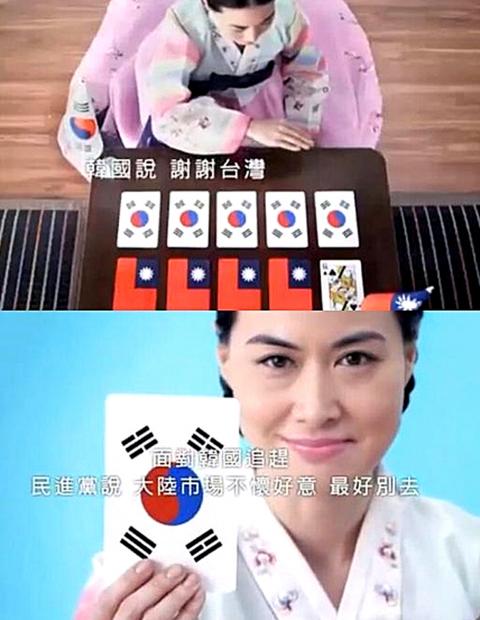A TV commercial released by the Chinese Nationalist Party (KMT) accusing the Democratic Progressive Party (DPP) of stalling the nation’s development, featuring a woman clad in traditional Korean dress with captions saying that South Korea — which has just reached a consensus with China on a free-trade agreement — is grateful to the opposition party for accelerating its trade deal with China has not only incurred criticism in Taiwan, but has also been frowned upon by foreign media.
The protagonist in the commercial, “Who Made South Korea Smirk [at Taiwan]?” is sitting at a table covered in playing cards decorated with either the Republic of China (ROC) or the South Korean national flag. As she turns them over, the ones with the South Korean flag always turn out to be aces, beating the queens bearing the ROC flag.
The voice-over says: “South Korea says: ‘Thank you, DPP, for blocking the bills in the legislature.’ South Korea says: ‘Thank you Taiwan, please take your time following us.’ Who will say sorry for Taiwan’s lost opportunities? Who will say sorry to the next generation? Who has allowed South Korea to snicker?”

Photo: Newsis Web site
Yang Chien-hao (楊虔豪), an independent reporter stationed in Seoul, said in an article published on the Thinking Taiwan Web site that the government has not made any effort to help the public understand the China-South Korea free-trade agreement, but it has been “blackmailing voters by stirring up anti-Korean sentiment.”
On a Facebook page Yang set up for his report on South Korea, he said that one of South Korea’s three biggest news agencies has reported on the commercial in an article entitled: “Taiwan’s ruling party uses [South] Korea as the material for its negative TV ad as part of its local election campaign.”
According to a translation posted online by a netizen, the report said that the KMT “publicly uses [South] Korea in its negative TV ad to criticize the largest opposition party due to its bleak election prospects.”
Commercials like these are used by the KMT to remind the public of the possible economic impact of a China-South Korea free-trade agreement and to pass the buck to the opposition party, which opposes signing the cross-strait service trade agreement, the report said.
Tokyo Keizai, a Japanese weekly magazine, put it more bluntly: “Swept by anti-Korea commercial! Taiwan’s overheated election campaign: The KMT has pushed anti-Korea sentiment to the fore in Taiwan’s local election.”
Deputy editor Fukuda Keisuke said that it was not the first time that the KMT has attacked the DPP by using anti-Korean sentiment.
“It almost seems like the KMT regards [South] Korea as its cheerleader ... In 2007, the KMT compared [South] Korea’s GDP to Taiwan’s as part of its propaganda against the DPP administration,” he wrote.
Compared with the KMT’s self-pity, South Korea, the “supposed competitor,” has not paid much attention to Taiwan, he wrote, adding that while there might be a lot of self-satisifed reports in South Korea on the signing of the agreement, “you don’t see remarks like: ‘We’re better off than Taiwan.’”
“Nothing productive can be generated by this kind of comparison,” he wrote.

A Ministry of Foreign Affairs official yesterday said that a delegation that visited China for an APEC meeting did not receive any kind of treatment that downgraded Taiwan’s sovereignty. Department of International Organizations Director-General Jonathan Sun (孫儉元) said that he and a group of ministry officials visited Shenzhen, China, to attend the APEC Informal Senior Officials’ Meeting last month. The trip went “smoothly and safely” for all Taiwanese delegates, as the Chinese side arranged the trip in accordance with long-standing practices, Sun said at the ministry’s weekly briefing. The Taiwanese group did not encounter any political suppression, he said. Sun made the remarks when

The Taiwanese passport ranked 33rd in a global listing of passports by convenience this month, rising three places from last month’s ranking, but matching its position in January last year. The Henley Passport Index, an international ranking of passports by the number of designations its holder can travel to without a visa, showed that the Taiwan passport enables holders to travel to 139 countries and territories without a visa. Singapore’s passport was ranked the most powerful with visa-free access to 192 destinations out of 227, according to the index published on Tuesday by UK-based migration investment consultancy firm Henley and Partners. Japan’s and

BROAD AGREEMENT: The two are nearing a trade deal to reduce Taiwan’s tariff to 15% and a commitment for TSMC to build five more fabs, a ‘New York Times’ report said Taiwan and the US have reached a broad consensus on a trade deal, the Executive Yuan’s Office of Trade Negotiations said yesterday, after a report said that Washington is set to reduce Taiwan’s tariff rate to 15 percent. The New York Times on Monday reported that the two nations are nearing a trade deal to reduce Taiwan’s tariff rate to 15 percent and commit Taiwan Semiconductor Manufacturing Co (TSMC, 台積電) to building at least five more facilities in the US. “The agreement, which has been under negotiation for months, is being legally scrubbed and could be announced this month,” the paper said,

Japan and the Philippines yesterday signed a defense pact that would allow the tax-free provision of ammunition, fuel, food and other necessities when their forces stage joint training to boost deterrence against China’s growing aggression in the region and to bolster their preparation for natural disasters. Japan has faced increasing political, trade and security tensions with China, which was angered by Japanese Prime Minister Sanae Takaichi’s remark that a Chinese attack on Taiwan would be a survival-threatening situation for Japan, triggering a military response. Japan and the Philippines have also had separate territorial conflicts with Beijing in the East and South China